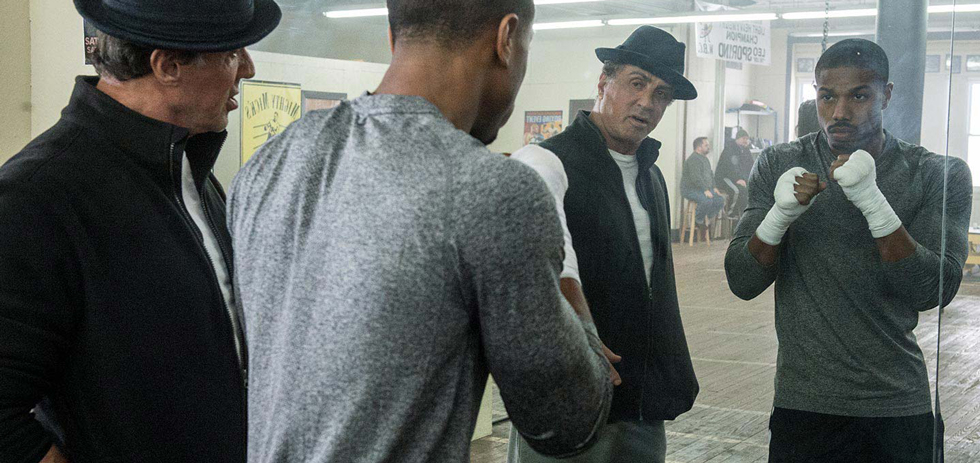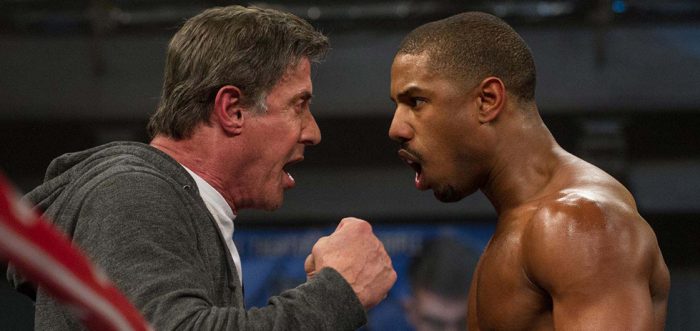
The Rocky franchise has been on life support for some time. While the cheesy III and IV have some replay value in Mr. T and then Dolph Lundgren featuring as Rocky’s increasingly cartoonish adversaries, Rocky V was a complete non-starter, and Rocky Balboa—which ditched the roman numerals, as well as V’s subplot of punch-induced brain damage ending Rocky’s career—felt somewhat arbitrary. It was neither bad enough to invite criticism, nor good enough to rehabilitate the ailing genre: it came and went, and Creed, its next sequel, seemed fated for the same. Make no mistake: this movie is really good.
The film’s narrative almost bypasses the last few entries in the franchise, finding root in Rocky Balboa’s nemesis-turned-friend-turned-trainer Apollo Creed, by focusing on Apollo’s illegitimate child, Adonis (Michael B. Jordan). The young Adonis, conceived just before Apollo’s death in Rocky IV, grew up without his father, in a series of group homes, where he demonstrates his father’s penchant for fighting, notching more and more solitary confinement with each win. Eventually, Apollo’s widow adopts him, and the next few years flash by. We are first introduced to the adult Adonis boxing in Tijuana backrooms, and then backing up for his job as a consultant: he struggles to balance his wealth and privilege against what’s presented as a genetic need to fight. The fighting wins out, and he goes to Philadelphia in search of a coach in Rocky (Sylvester Stallone).
Class is a prominent theme in the film, as Adonis—presumably ‘sheltered’ by virtue of his adopted wealth—is positioned as a silver spoon athlete, who never had to suffer for his success, as opposed to big bad “Pretty” Ricky Conlan, who grew up on the docks. This is a kind of discussion that surfaces occasionally in the Big Four American Sports: of the tension between the privileged middle-class athletes, and the athletes who played their way out of the ghetto. Though to be honest, the film doesn’t have anything particularly illuminating to say on this issue. The resolution, for Adonis, is simply to emphasise the poverty of his youth, and to ignore his previous job in consultancy and his upbringing in Apollo Creed’s old mansion. In this sense, the film takes an easier narrative route, but one that still feels true to the character.
A main complaint for the contemporary boxing film is its adoption of a cartoonish form of violence, as chop-suey editing serves only to further undermine the guts of the fighting in the ring. While Coogler occasionally opts for these theatrics, the film is broadly a return to form, with long takes in the ring showing rallies of punches. Coogler also gets points for a number of innovations, as he uses rapid-tilts of the camera to show Adonis’s dizzy-headed collapse on being knocked out. It creates a really visceral sense of the violence in the ring, and also finds a way to convey the actual experience of having your brain get shut down.
On this point, there is one gag late in the film—and I can’t believe I’m a voice for censure—that the film could have done without. A coach helps one boxer trick the fight doctor into declaring him fit to continue boxing, and it’s played for laughs. Concussions and injuries are still serious business—especially as NFL players suffer from a life expectancy below 60 (which is made worse if you only take the linemen) and every season we hear more horror stories of athletes suffering career ending injuries, brain damage, or worse, from staying on the field when they shouldn’t have. It’s an endemic problem in the sports media, who deify the athletes who risk permanent damage to themselves for the sake of victory.1 Creed, for a while, seemed to be bucking this trend, as Adonis is warned against taking up boxing lest he end up brain damaged, before going on to endorse the very kind of behaviour that leads these injuries to happen. It’s a bad example, and not worth the gag at all.

On a more positive note, the film manages to build much comedy out of Adonis’s Generation Y-ness. For too long, the protagonists of these boxing films (See, Gyllenhaal, J, in Southpaw) have been portrayed with the same intellectual and technological illiteracy, affecting that naïve-but-good-natured knucklehead vibe that Rocky perfected. Against this grain, one scene shows Rocky writing a set of exercises on paper for Creed, who proceeds to take a photo of them with his phone and sync them “up in the cloud”. This generational shift happens in the film’s soundtrack as well, which takes the orchestral influence of the series as a whole and reinvigorates it with a new hip-hop vibe. Future, Meek Mill, The Roots, Nas, and even 2Pac (!) feature, and Coogler casts a musician in Tessa Thompson (Dear White People, Selma) as Adonis’s beau, allowing her voice to feature as well.
Similarly, the ubiquity of statistics, background information, and Adonis’s position as a boxing obsessive is manifested visually with freeze-frames and information panels appearing on the screen, indicating every rival boxer’s record, nickname, and specialty. For an inexplicable reason, Coogler does not use this same conceit on Rocky Balboa, which is a missed opportunity to establish Rocky’s actual record as a fighter.2
At times, the film’s emphasis on close-up—almost the entire film is shot in a claustrophobic kind of quasi-documentary framing—can distract or undermine what we’re trying to see, as Coogler’s best scenes tend to also be the ones where he backs off and lets the scene breathe. In the same vein, the structure of the story is built more around a number of discrete climaxes, as opposed to one singular end point, and in this way it may feel as if the pacing is off. However, these problems are broadly rehabilitated by the effective nature of the fight scenes, which manage to restore any lost tension and build up as discrete moments of triumph in and of themselves. Creed is a major success, and the infrastructure Coogler builds around Michael B Jordan’s Adonis Creed could easily become the foundation for a franchise, allowing Sylvester Stallone to age gracefully and take up less space on the screen, while still conveying that punch-drunk wisdom.
Around the Staff
| Dominic Ellis | |
